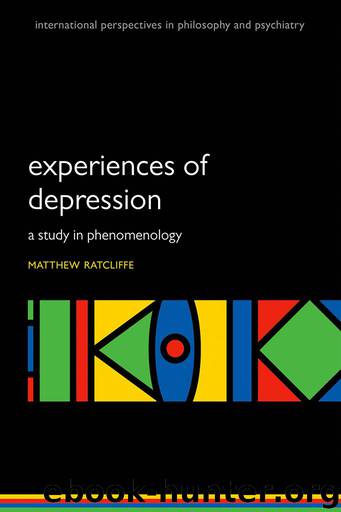Experiences of Depression: A study in phenomenology by Ratcliffe Matthew

Author:Ratcliffe, Matthew
Language: eng
Format: epub
Publisher: Oxford University Press
Published: 2014-11-03T16:00:00+00:00
* * *
1 For an exception, see Cataldi (1993), who also observes that the topic of emotional depth has been neglected by philosophers.
2 Several philosophers have argued that emotions involve perceiving the significance of things. See, for example, de Sousa (1990, Chapter 7), Deonna (2006), and Goldie (2007).
3 See, for example, Stocker and Hegeman (1996, p.285) for the claim that guilt involves attribution of responsibility whereas shame need not.
4 There are also more mundane experiences of irrational guilt. For example, Elster (1999, p.151) says that he feels guilty when friends travel a long way to see him and it rains throughout their stay.
5 See Stocker (2007) for a comprehensive discussion of the various criteria that have been proposed for distinguishing guilt from shame. He concludes that they all fail but retains the view that shame and guilt are importantly different, maintaining that the relevant criteria have yet to be identified.
6 This applies especially to ‘melancholic depression’, a proposed subtype that has been the primary focus of phenomenological research on depression (e.g. Tellenbach, 1980; Fuchs, 2003; Stanghellini, 2004). It corresponds roughly to the DSM category of ‘major depression’ with ‘melancholic features’.
7 This transformation can be interpreted in terms of what Heidegger calls ‘thrown projection’ [geworfener Entwurf] (1962, p.188). According to Heidegger, we are ‘thrown’ into the world, meaning that we find ourselves in a place that is not of our own making, where things present themselves as significant to us in a range of ways. Inextricable from this is the way in which we ‘project’ ourselves towards some of the significant possibilities that the world offers, understanding both ourselves and the things around us in terms of the possibilities we strive to actualize. This kind of depression, one might say, involves a change in the structure of ‘thrown projection’, where various kinds of possibility are removed from the world into which one is ‘thrown’, and with them the possibility of purposively pursuing anything at all. Passively waiting for some threat to be realized replaces the usual orientation towards future possibilities. See, for example, Tellenbach (1980) for an account of depression that draws on Heidegger.
8 My position here is consistent with the view that ‘autobiographically past-directed emotions’ involve current emotional responses to remembered events rather than remembered emotions (Debus, 2007). One remembers one’s past activities through the existential guilt, and therefore cannot summon past emotions that are incompatible with guilt.
9 Fuchs (2003, p.239) describes the experience as follows: ‘The melancholic is so identified with his guilt that he is guilty per se; this corresponds to an archaic, undifferentiated self-perception. He feels like being the center of a “guilt-world”, in which everything becomes a sign of his omission. There is no forgiveness, no remorse or reparation in the future; being guilty comprises his total being’.
10 Heidegger (1962, Division Two, II) claims that guilt is an unavoidable correlate of our freedom. A being that directs itself towards the possible will inevitably fail to actualize certain possibilities; we are never all that we could be.
Download
This site does not store any files on its server. We only index and link to content provided by other sites. Please contact the content providers to delete copyright contents if any and email us, we'll remove relevant links or contents immediately.
Should I Stay or Should I Go? by Ramani Durvasula(7649)
Why We Sleep: Unlocking the Power of Sleep and Dreams by Matthew Walker(6694)
Fear by Osho(4727)
Flow by Mihaly Csikszentmihalyi(4684)
Rising Strong by Brene Brown(4448)
Why We Sleep by Matthew Walker(4432)
The Hacking of the American Mind by Robert H. Lustig(4368)
How to Change Your Mind by Michael Pollan(4353)
Too Much and Not the Mood by Durga Chew-Bose(4333)
Lost Connections by Johann Hari(4169)
He's Just Not That Into You by Greg Behrendt & Liz Tuccillo(3878)
Evolve Your Brain by Joe Dispenza(3665)
The Courage to Be Disliked by Ichiro Kishimi & Fumitake Koga(3477)
Crazy Is My Superpower by A.J. Mendez Brooks(3394)
In Cold Blood by Truman Capote(3374)
Resisting Happiness by Matthew Kelly(3336)
What If This Were Enough? by Heather Havrilesky(3302)
The Book of Human Emotions by Tiffany Watt Smith(3289)
Descartes' Error by Antonio Damasio(3270)
